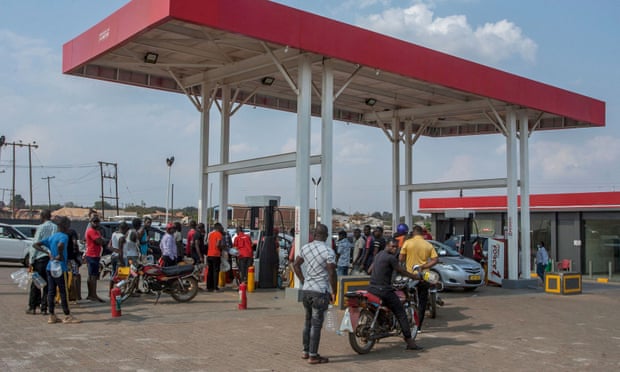Motorists forced to pay premium for smuggled black market fuel or drive to service stations at border with neighbouring Mozambique

People wait to buy fuel at a petrol station in Area 49, Lilongwe. Photograph: Amos Gumulira/AFP/Getty Images
Global development is supported by
Madalitso Wills Kateta in Lilongwe
Wed 31 Aug 2022 16.00 AEST
Motorists in Malawi are having to rely on fuel smuggled in from neighbouring Mozambique as pumps across the country run dry, while some drivers told the Guardian they had to cross the border to get petrol as the country grapples with severe shortages.
“We have been depending on smuggled fuel from Mozambique,” said Allick Pondani, a motorist from the southern Malawi district of Phalombe. “Some entrepreneurs have taken advantage of the situation and are smuggling the scarce commodity, which they are selling at 50% over the normal pump price.”
On Monday, Malawians traveling from the capital, Lilongwe, to the commercial city Blantyre told of making a 66-mile detour to fill up in Lizulu, a town on the Malawi-Mozambique border.
Blessings Masache had travelled to Lizulu to buy fuel for his fleet of taxis but was disappointed to find pumps already dry due to high demand.
Malawi has had fuel shortages since April as global fuel price rises and a shortage of foreign exchange currency leave the government struggling to pay for petrol imports. Problems have escalated over the past week as petrol stations across the country report running out of petrol.
Authorities said shortages in the capital over the weekend were due to “a surge in demand in Lilongwe and parts of the central region” because of events held in the city, including a concert by Nigerian singer Kizz Daniel.
Running wild: the children driven to a life of crime on the streets of Malawi
Read more
The National Oil Company of Malawi, a government body that imports and reserves fuel, said on Monday: “We assure Malawians that the sporadic fuel supply is being corrected as the product is being released from the Strategic Fuel Reserves as well as from other importers to ensure sustainable availability at all service stations in Lilongwe and throughout the country.”
Hendrix Chiwaya, a taxi driver in Lilongwe, said he had been forced to increase his fares. “The fuel shortages are hitting us hard, and our customers are paying more than the normal fare because we are forced to source fuel from the black market to remain in business,” he said.
Government departments have withdrawn the use of some of their vehicles, retaining only those needed for core operations